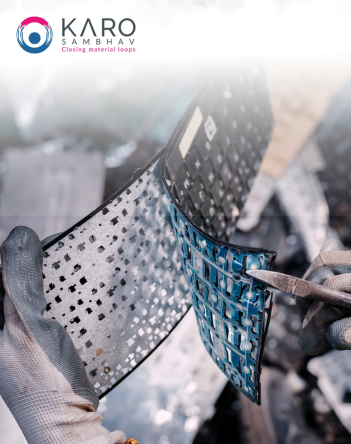Karo Sambhav collaborates with leading organisations to jointly develop industry frameworks, standards, governance mechanisms, systems and processes that advance the transition to circular economy. know more about our alliances.
Electronic waste is an emerging threat to the environment and public health. Are you aware of the disastrous consequences of the mounting volumes of electronic waste? As cited by the UN, every person in the world is projected to generate 7.6 Kg of e-waste, accounting for a whopping 57.4 million tons of waste globally. Little did you know that waste is toxic and hazardous. It comprises harmful chemicals and substances like lead, cadmium, barium, lithium, and more. Not only are the chemicals corrosive and flammable, but they are also highly malignant to the environment and health. For instance, too much exposure impairs the skeletal system, heart, brain, kidney, and liver. What’s worse? It is a leading cause of cancer today.
As per reports, Cancer in India is expected to spike to 29.8 million by 2025. The number is certainly alarming. Hence, it is crucial to put an end to the surging volumes of electronic waste right away. Besides, the lack of infrastructural facilities for disposal and recycling adds to the burgeoning problem. Policymakers and the top e-waste companies in India are working round-the-clock to manage the surging waste pile.
Electronic gadgets are expected to make our lives and work easy and hassle-free. Unfortunately, the constant evolution of devices has reduced the life of electronic gadgets. Results? Quick upgrades and newer innovations coerce consumers to toss out or replace electronic products quicker than usual, thereby adding to the growing waste stream.
Nevertheless, significant growth in the IT and communication sectors have amped up the consumption of electronic goods. Businesses are quick to discard electronic equipment and opt for newer upgrades, irrespective of the gadgets turning defunct or faulty. Of course, the trashed electronics add to the surging solid waste stream. It is a no-brainer that the growing problem of e-waste calls for a significant emphasis on strategic and better e-waste management. In an initiative to optimise recycling and effective waste management, EPR awareness is considered an immediate solution.
Are you curious to understand what EPR e-waste is all about? Simply put, EPR stands for Extended Producer Responsibility, a strategic policy that allocates producers and manufacturers a financial and physical responsibility to monitor the lifecycle of products. EPR awareness takes into account the environmental costs associated with a product. In short, the policy illustrates that producers are absolutely in charge of the treatment and disposal of post-consumer electronic products.
It is no secret that e-waste is dangerous when disposed of improperly. Wondering what the odds are? Let’s explain:
Electronic devices comprise heaps of heavy metal and toxic substances. Chromium, mercury, and lead, for example. Trashing the products in landfills for long causes the toxic chemicals to leach into the grounds. This naturally contaminates the soil, air, and, of course, waterways. As per EPA, almost 60 million tons of e-waste are stashed every year across the globe. It spikes pollution and aggravates respiratory issues and other air-borne diseases.
Are you aware of the effects of greenhouse gas emissions on planetary and climate crises? The growing scales of carbon dioxide, ozone, methane, and nitrous oxide is not just detrimental to the environment but equally harmful to human health. The toxic gas emissions target the respiratory system and the nervous system. What’s more, the awful gases spike disorders such as bronchitis, asthma, and more.
Did you know that global warming, a side-effect of greenhouse gas emissions, spikes the chances of contagious diseases like malaria, dengue, cholera, and more?
EPR awareness aims to conserve the depleting volumes of natural resources. Wondering how? Well, even the simplest of electronic devices contain a promising ratio of heavy metals, including gold. Did you know that a regular circuit board comprise some amount of gold in it? Why just gold? Electronic products contain valuable materials such as platinum, aluminium, silver, copper, etc. Keeping the electronics out of landfills or recycling them ensures a better chance of reclaiming the materials. This naturally scales down the pressure of mining the resources. Little did you know that the rippled effects are far more beneficial than you are aware about.
For example, less mining implies lesser demand for raw materials. It naturally lowers the cost of gadgets. More importantly, it declines the mounting volumes of waste generated. In a nutshell, conserving natural resources is not only valuable from an economic point of view but paves the way for a greener planet and flourishing health.
The top e-waste recycling companies in India are rightfully commissioned to address and tackle the increased generation of waste. PROs like Karo Sambhav collaborates with enterprises, manufacturers, and government agencies to ensure that producers are equipped with adequate infrastructure and knowledge for the better management of e-waste disposal. The initiative aims to conserve the earth’s natural resources and contribute to the hale and hearty health of Indians.
Karo Sambhav collaborates with leading organisations to jointly develop industry frameworks, standards, governance mechanisms, systems and processes that advance the transition to circular economy. know more about our alliances.





